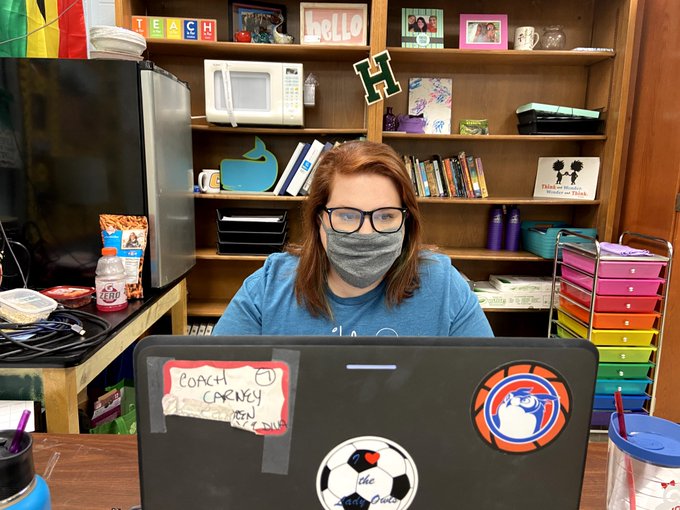
The virtual learning experiment at Metro Nashville Public Schools is two weeks old, but Hunters Lane High School near Madison, has already been operating somewhat virtually since the 2014-2015 school year. They’ve seen plenty of benefits along the way, including an increase in test scores, graduation and student participation rates.
The district’s pivot to virtual learning has ignited concerns about who has and doesn’t have access to reliable technology. But Hunters Lane Principal Susan Kessler is convinced that scaling back on in-person classes just might work for students.
“Our kids really are ready for it. They lived most of their lives in the virtual setting,” says Kessler, a 26-year educator and nationally known blended learning expert. “We were the ones saying, ‘No, you need to go sit in a brick-and-mortar building and look at a whiteboard,’ because that’s how we’ve always done it.”
Kessler’s confidence comes from experience. She arrived at Hunters Lane after the threat of a state takeover, and has seen noteworthy improvements since the school added interventions and pivoted to a mix of virtual and in-person classes six years ago. The school has had greater academic achievement and higher college admission rates — with the most noticeable progress in the share of kids being accepted into their preferred colleges.
The rate was 77% for the class of 2019. These seniors also earned more than $7 million in scholarships.
“Families are going to realize that for some kids, this is going to work better for them than in-person does,” says Kessler.
Kessler says the traditional way of doing things hasn’t proven to work for all students. The pandemic pushed education leaders to get creative and adjust their approach.
“This is sort of forcing a quicker evolution in K-12 education,” says Kessler. “But it doesn’t mean it’ll replace what we did do. Because we’re going to continue to do the things that matter the most about school.”
Still, while Kessler see’s virtual learning as a good thing and is optimistic about the school year, she says the transition to all-virtual learning — which is different than Hunters Lane’s blended learning model — won’t be perfect.
“When there’s bad weather in a neighborhood and it cuts off their cable or the electricity, everyone is gong to have to adapt,” says Kessler. “There will be bumps in the road.”
On the first day of classes, Metro Schools did have some hiccups as parents attempted to access the district’s online server, but the outage was resolved quickly.
Finding a model that works for all students
Since the spring, Metro Schools has distributed more than 44,000 hot spots and laptops to students. They’ve also made a commitment to eventually provide all students with personal computers — thanks to federal COVID-19 relief funding.
“I really do think that this is an extension of beginning to look at individual learning communities, individual learning needs, individual families in a way that could be transformative for the district,” says Jennifer Hill, the vice president of policy and programming at the Nashville Public Education Foundation, an advocacy group.
Hill says the pandemic is giving parents a chance to customize how their kids are educated. She also says “it’s moved education beyond the walls of the building and opened it up to families who may not have been traditionally welcomed in schools.”
This is something that many parents, who say the traditional way of educating kids isn’t something they want to go back to, also agree with.
“A lot of times schools don’t have parents at the table,” says Victoria Gordon, a member of parent group Nashville PROPEL. “If more parents are a part of the policy and decision making, we can improve our schools.”
Education leaders say schools have been operating on a one-size-fits-all learning model that’s driven decades of inequities — like the technology gap. The pandemic changed that, and it’s also opened up a conversation about who traditional schooling benefits.
“I’ve been reading some interesting pieces lately by education bloggers saying, ‘Don’t assume that kids are sitting at home in a miserable situation,'” says Gini Pupo-Walker, a Metro Nashville school board member and nonprofit education director. “Some of them, are for the first time, able to learn without being in an oppressive environment, and are able to be free from what they consider a restrictive place to learn.”
Pupo-Walker says she isn’t sure what virtual learning and the pandemic will bring, but that this may be a moment where families are able to take the reins of their own education.

